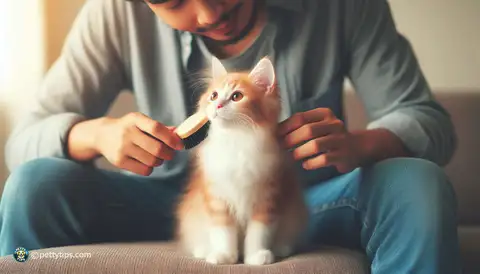
Teaching Grooming Etiquette to Newly Adopted Cats
Alexander Green - Sep 27, 2024 - 6 min read


Cats are fascinating creatures, aren't they? With their mysterious demeanor and graceful movements, they often captivate our hearts effortlessly. However, behind those mesmerizing eyes lies a complex psyche that can be affected by various factors, including stress. As pet owners and lovers, it's crucial to delve into the intricacies of our feline friends' behavior, especially when it comes to something as fundamental as their litter box habits.
One of the primary indicators of a cat's well-being is its litter box behavior. Cats are inherently clean animals, and they have a natural instinct to bury their waste. However, deviations from this behavior can signify underlying issues, such as stress. Understanding what constitutes normal litter box behavior and recognizing the red flags indicating stress is paramount in ensuring our furry companions lead happy and healthy lives.
Cats may not express stress in the same way humans do, but they certainly exhibit subtle cues that reflect their inner turmoil. From changes in appetite and grooming habits to increased vocalization and avoidance behavior, these signs can manifest in various ways. Moreover, stress can significantly impact a cat's litter box behavior, leading to changes that may initially go unnoticed but can have significant implications for their overall well-being.
Stress has a profound effect on a cat's behavior, and its relationship with litter box aversion is no exception. When a cat experiences stress, whether due to environmental changes, conflicts with other pets, or health issues, it may resort to avoiding the litter box altogether. This aversion can manifest as urinating or defecating outside the litter box, which is not only frustrating for pet owners but also indicative of an underlying problem that needs to be addressed promptly.
Cats are creatures of habit, and any disruptions to their familiar surroundings can trigger stress. Whether it's moving to a new home, rearranging furniture, or introducing new household members, changes in the environment can unsettle cats and affect their litter box behavior. It's essential to minimize such disruptions as much as possible and provide a safe, stable environment for our feline companions to thrive.
Cats may be solitary animals by nature, but they still form bonds with their human caregivers and fellow feline companions. However, conflicts with other pets or changes in social dynamics within the household can lead to stress and subsequently impact litter box behavior. Understanding the dynamics between pets and addressing any conflicts promptly can help alleviate stress and restore harmony in the home.
Underlying health problems can also contribute to stress in cats and affect their litter box behavior. From urinary tract infections and gastrointestinal issues to chronic pain and mobility issues, any discomfort or pain can cause a cat to avoid the litter box. Regular veterinary check-ups are essential for detecting and addressing any health issues early on, thereby minimizing stress and ensuring optimal well-being for our furry friends.
Cats thrive on routine, and any disruptions to their daily schedule can trigger stress. Whether it's changes in feeding times, litter box maintenance, or play sessions, deviations from their established routine can unsettle cats and affect their behavior. Maintaining a consistent schedule and providing enriching activities can help alleviate stress and promote a sense of security and well-being for our feline companions.
Providing a safe, secure environment is paramount in helping cats cope with stress and promoting healthy litter box behavior. Creating designated areas where cats can retreat and feel safe, such as cozy hiding spots or elevated perches, can give them a sense of security and control over their environment. Additionally, ensuring ample resources, such as food, water, and litter boxes, in multi-cat households can help minimize competition and reduce stress.
Stimulating the senses and providing opportunities for mental and physical stimulation is essential for promoting well-being in cats. Enriching the environment with interactive toys, scratching posts, and puzzle feeders can help alleviate boredom and reduce stress. Additionally, incorporating vertical space, such as cat trees and shelves, allows cats to exercise their natural climbing and perching instincts, providing both physical and psychological benefits.
Proper litter box management is crucial for addressing litter box aversion and reducing stress in cats. Ensuring litter boxes are clean, accessible, and placed in quiet, low-traffic areas can encourage cats to use them consistently. Additionally, using unscented, clumping litter that mimics the texture of natural soil can appeal to a cat's instinctual preferences. Providing multiple litter boxes, especially in multi-cat households, helps prevent competition and reduces the likelihood of litter box aversion.
In cases where stress-related litter box issues persist despite implementing management strategies, seeking professional guidance from a veterinarian or animal behaviorist is recommended. These experts can conduct a thorough evaluation to identify the underlying causes of stress and develop a tailored treatment plan to address the issue effectively. Whether it's implementing behavior modification techniques, prescribing medication, or making environmental modifications, professional guidance can help alleviate stress and promote healthy litter box behavior in cats.
Understanding the impact of stress on cat litter box behavior is crucial for promoting the well-being of our feline companions. By recognizing the signs of stress, identifying potential triggers, and implementing appropriate management strategies, we can help alleviate stress and ensure our cats feel safe, secure, and content in their environment. Remember, a happy cat is a healthy cat, and by prioritizing their emotional and physical needs, we can foster strong bonds and enriching relationships with our beloved pets.